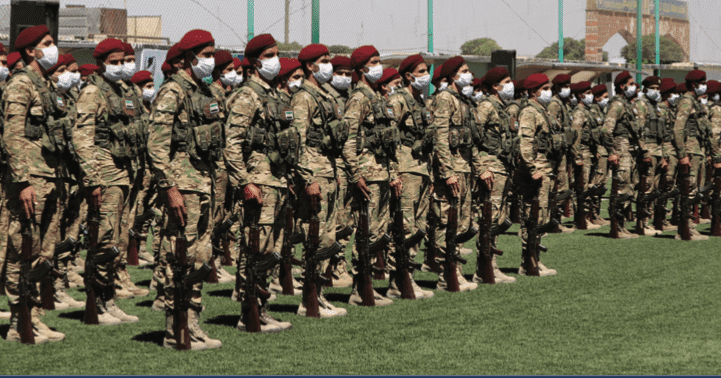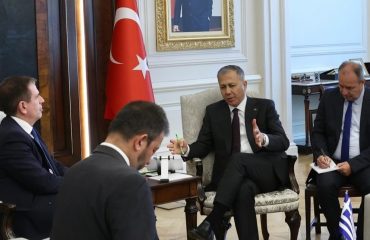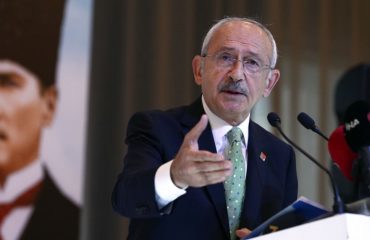

A report by SETA Foundation, a Turkish NGO close to the government, might be behind the U.S. accusation on Turkey about “child soldiers.”
In its July 1 human smuggling report titled “Trafficking in Persons,” the U.S. State Department counted Turkey among the countries that support the recruitment and use of “child soldiers.”
According to the claim, Turkey, the first NATO member to be included in this list, allegedly had “concrete support” to Sultan Murad Division, a part of the anti-regime Syrian National Army (SNA) and the Sultan Murad Division was among the organizations that recruited children and send them to war, according to the U.S. lists. In the same report, the YPG, the branch of the outlawed PKK that cooperates with the U.S. on the ground in the fight against ISIL in Syria, and the YPJ, another Syria arm of the PKK that is made up of women, are also accused of recruiting boys and girls despite warnings and the age limit fell even to 12 years old.
In a written statement on July 2, the Turkish Foreign Ministry strongly denied the U.S. State Department allegation. Emphasizing that the child soldier record of the PKK/YPG, which the U.S. supports, is also seen in the United Nations reports, the Turkish ministry said “It is the most striking example of double standard and hypocrisy that the U.S. blatantly slanders Turkey on this issue.”
The Turkish Foreign Ministry said these “baseless” allegations and the U.S. State Department was trying to overshadow Turkey’s efforts to combat human trafficking.
“We regret that our efforts are trying to be obscured by the mention of allegations from some NGOs of dubious reliability and their groundless assumptions,” it said
But which NGO’s had written these reports?
SETA’s open intelligence study
A report on the matter was published in 2020 by the Political, Economic and Social Research Foundation (SETA), which is in line with the ruling Justice and Development Party (AKP) government. The author of the report is Ömer Özkızılcık, one of SETA’s Security Research experts. He is also the “chief editor” of SETA’s “Syria Agenda” publication.
Özkızılcık, or Ozkizilcik according to the spelling on SETA’s Turkish-language web pages, studied with both Syrians living in Gaziantep, Kilis and Şanlıurfa in southeastern Turkey and a total of 1551 “SNA warriors” in face-to-face interviews conducted in the Syrian town and cities of Tal Abyad, Suluq, Tal Khalaf, Rasulayn, Azaz, Al-Rai, Afrin, Jinderes, and Shaikh Hadid on Nov. 22-Dec. 3, 2019, Dec. 11-18, 2020 and Feb. 12-16, 2020. In other words, Özkızılcık and his team went to the war zone of Turkey’s Operation Olive Branch in Syria with special permission, and they were allowed to meet with the fighters so that they prepared a detailed report.
Burhanettin Duran, a SETA General Coordinator, a columnist at the pro-government Sabah newspaper, a programmer at private broadcaster NTV and a member of the Presidency Security and Foreign Policy Board, explains why such a report was necessary:
“[During Turkey’s operations in Syria] The western media portrayed
the successor of the Free Syrian Army – the Syrian National Army – as Turkey’s proxy, mercenaries, or worst. Even outspoken defenders of the armed Syrian opposition were forced into a corner and abandoned their political stance arguing that the Syrian National Army is not the old Free Syrian Army.”
“To find a pathway forward, it is essential to gain a better understanding of the fighters in the Syrian National Army. This report is the first contribution of its kind to the relevant literature and provides an exemplary insight into the Syrian National Army based on empirical research and analysis.”
In a Turkish language version of the report, Duran says “the report fills this gap in the literature.”
“This report, written by Ömer Özkizilcik, is an important contribution to the discussions that need to be made in the academic and intellectual dimension of the phenomenon in question. Because the author of the report provides data-based information about the SNA, Turkey’s local ally in Syria, and introduces the SNA and its soldiers to the Turkish public. Although there are different studies on SNA in the Turkish literature, this report is a first in its field in terms of providing concrete figures and data.”
Why was that “important report” removed?
However, the report –“a first in its field” and “an important contribution to the academic and intellectual dimensions,” according to Duran– was removed from SETA’s website shortly after its publication. (Here is a link for the deleted report)
Daily Cumhuriyet’s reported Hüseyin Hayatsever said in a report on Nov. 21, 2020, that the article which showed that “children were armed” was removed.
Because the report that also covers demographic data showed that some 10.34 percent of the SNA fighters were between the ages of 18 and 20.
The data proved that most of the SNA fighters at the given ages were recruited before the age of 18 as the report also showed that the rate of those who attended group less than a year ago was 88 per thousand as 1.15 percent of participants were recruited between one and two years and the rate of those who joined the group between two and three years stood at 1.63 percent; The rate of those who had been fighting for more than three years was 4.27 percent. The SETA report also said the average age of the “Turkmen fighters” is lower than that of the Arab, Kurdish and Circassian “fighters.”
In other words, the only thing left to the U.S. Department of State’s “Intelligence and Research” Office and human rights units was basic maths on the open intelligence provided by SETA.
Another SETA report in 2019, accused journalists, who were fired due to a shift in media as the AKP was taking control, of being an “extension” of foreign interests, because they found jobs in international media organizations. And more recently, some people were fired from SETA recently following internal conflicts. So now I wonder what the two former SETA executives – Chief Advisor to the President for Security and Foreign Policies İbrahim Kalın and head of the Presidency’s Communications Director Fahrettin Altun– think about this issue.
In summary, there is a possibility that SETA, a think tank in line with the AKP will emerge under the accusation of the U.S. against Turkey in the “child soldiers” issue.
Among the main sponsors of SETA is Turkuvaz Media, which also hosts the Sabah-aTV group under the management of Serhat Albayrak. The owner of the Turkuvaz Group is Orhan Cemal Kalyoncu, who is also one of the owners of Kalyon İnşaat, a company seen in many public tenders. What do they think?
And for SETA, was the Turkish Foreign Ministry speaking of SETA’s report while slamming the U.S. State Department for crediting unreliable NGO reports that bring front “baseless assumptions?”


